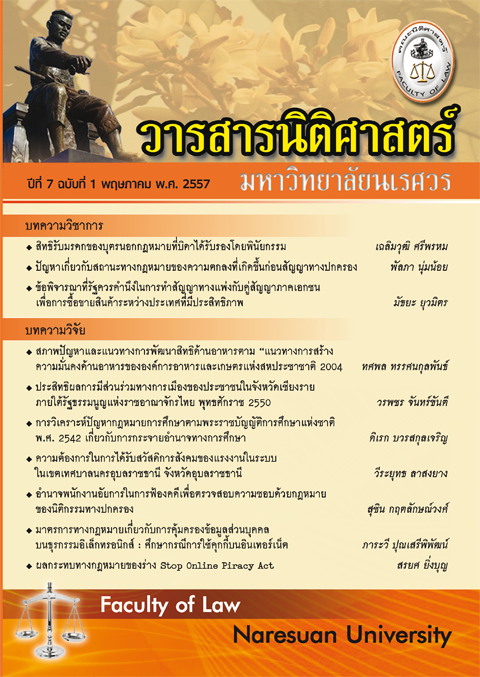The Right of Inheritance of Illegitimate Children Having Recognised
Main Article Content
Abstract
According to the Thai Civil and Commercial Code, illegitimate children whose parents are not legally married to one another have no right to inherit their father’s patrimony. Section 1627 thereof, notwithstanding, stipulate that illegitimate children who were recognised by their fathers explicitly are regarded as descendants. This article suggest that the fathers’ recognition not only conduct during when they were alive, but also after they were dead, especially the recognition by their wills. Moving on to the next point, as a result of said recognition in accordance with section 1627, such children are demand to be the descendants of their father whether the fathers desire their children can inherit their estates or not. Nonetheless, pursuant to the Thai Civil and Commercial Code section 1608, given that the fathers do not want their children who are legally heir to succeed their inheritance, The fathers can disinherit their heirs by expressly declaration of intent by will or in writing deposited with the competent official.
Article Details
References
เฉลิมชัย เกษมสันต์. คำอธิบายประมวลกฎหมายแพ่งและพาณิชย์ ว่าด้วยมรดก. พิมพ์ครั้งที่ 4. กรุงเทพฯ: สำนักอบรมศึกษากฎหมายแห่งเนติบัณฑิตยสภา, 2552.
เบญจพล สาธิตสมิตพงษ์. “สิทธิของบุตรนอกสมรส.” วิทยานิพนธ์มหาบัณฑิต คณะนิติศาสตร์ มหาวิทยาลัยธรรมศาสตร์, 2548.
อัมพร ณ ตะกั่วทุ่ง. คำอธิบายประมวลกฎหมายแพ่งและพาณิชย์ บรรพ 6 ว่าด้วยมรดก. กรุงเทพฯ: ติบรรณการ, 2550.
Andrew Borkowski. Textbook on Succession. 2nd Edition. Great Britain: Oxford University Press, 2002.
Chung Hui Wang. The German Civil Code. London: Stevens and Sons, 1907.
Ernest J. Schuster. The Principle of German Civil Law. London : Stevens and Sons, 1907.
Gerhard Robbers. An Introduction to German Law. 5th Edition. Germany: Nomos Verlagsgesellschaft, 2012.
Marcel Planiol. Treatise on The Civil Law. Volume 3 Part 1, Translated by the Louisiana State Law Institute, 1938.
Nigel Foster and Satish Sule. German Legal System and Laws. 4th Edition. UK: Oxford University Press, 2011.
ประสพสุข บุญเดช. คำอธิบายประมวลกฎหมายแพ่งและพาณิชย์ บรรพ 5 ว่าด้วยครอบครัว. พิมพ์ครั้งที่ 19. กรุงเทพฯ: สำนักอบรมศึกษากฎหมายแห่งเนติบัณฑิตยสภา, 2554.
ปรีดี เกษมทรัพย์. “การใช้การตีความกฎหมาย.” วารสารนิติศาสตร์. 15, ฉ.1 (2528): 65–82.
พรชัย สุนทรพันธุ์. คำอธิบายกฎหมายลักษณะมรดก. พิมพ์ครั้งที่ 8. กรุงเทพฯ: สำนักอบรมศึกษากฎหมายแห่งเนติบัณฑิตยสภา, 2554.
พินัย ณ นคร. คำอธิบายกฎหมายลักษณะมรดก. พิมพ์ครั้งที่ 2. กรุงเทพฯ: วิญญูชน, 2555.
เพรียบ หุตางกูร. คำอธิบายประมวลกฎหมายแพ่งและพาณิชย์ว่าด้วยมรดก. พิมพ์ครั้งที่ 13.กรุงเทพฯ: โครงการต�ำราและเอกสารประกอบการสอน คณะนิติศาสตร์ มหาวิทยาลัยธรรมศาสตร์, 2555.
ไพโรจน์ กัมพูสิริ. “แบบของพินัยกรรมในกฎหมายแพ่งฝรั่งเศสและกฎหมายไทย.”
วารสารนิติศาสตร์. 40, ฉ.1 (2554): 14–42.
ไพโรจน์ กัมพูสิริ. คำอธิบายประมวลกฎหมายแพ่งและพาณิชย์ บรรพ 5 ครอบครัว. พิมพ์ครั้งที่ 7.กรุงเทพฯ: มหาวิทยาลัยธรรมศาสตร์, 2553.
รัศฎา เอกบุตร. คำอธิบายประมวลกฎหมายแพ่งและพาณิชย์ บรรพ 5 ว่าด้วยครอบครัว: บิดามารดากับบุตร. กรุงเทพฯ: โครงการตำราและเอกสารประกอบการสอน คณะนิติศาสตร์ มหาวิทยาลัยธรรมศาสตร์, 2552.
วรพจน์ วิศรุตพิชญ์. คำอธิบายประมวลกฎหมายแพ่งและพาณิชย์ ว่าด้วยมรดก. พิมพ์ครั้งที่ 2. กรุงเทพฯ: โครงการตำราและเอกสารประกอบการสอน คณะนิติศาสตร์ มหาวิทยาลัยธรรมศาสตร์, 2549.
วารี นาสกุล และเบญจวรรณ ธรรมรัตน์. กฎหมายแพ่งและพาณิชย์ว่าด้วยครอบครัว. กรุงเทพฯ: พลสยาม พริ้นติ้ง, 2554.
สุนัย มโนมัยอุดม. ระบบกฎหมายอังกฤษ. พิมพ์ครั้งที่ 5. กรุงเทพฯ: โครงการตำราและเอกสารประกอบการสอน คณะนิติศาสตร์ มหาวิทยาลัยธรรมศาสตร์, 2555.


